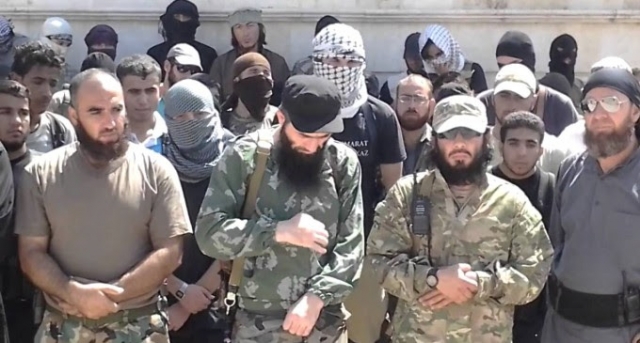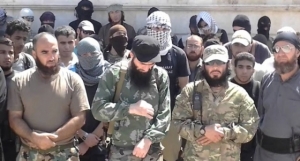Chechen-born Georgian Citizen Killed in Syria
TBILISI- A 39 year-old Chechnya-born Georgian citizen has reportedly been killed fighting for Islamist rebels in northern Syria.
Vakha Bugiyev, a Chechen who arrived in Georgia from war-ravaged homeland in mid-2000, died fighting for an unnamed Islamist group, according to human rights organization Democracy and Freedom Watch.
The Grozny-born Bugiyev was a resident of Georgia’s Pankisi Gorge, an isolated region that is home to more than 10,000 ethnic Chechens.
According to a local aide agency, Bugiyev was married to a woman from the Pankisi village of Omalo and had been arrested in 2003 for an illegal border violation after he failed to renew his mandatory refugee status with Georgian authorities.
Local police later released Bugiyev and allowed him to re-register, but he again ran afoul with law enforcement officials in August 2012 when he was involved in a deadly shootout with Georgian interior ministry troops. At least seven Chechens were killed in the firefight along with three members of the interior ministry unit who had been deployed to apprehend the group.
Related coverage: Pentagon Confirms Georgian-born Shishani’s Death
According to an investigation carried out by the local public defender’s office, the militants were on their way to Dagestan in Russia’s North Caucasus when border guards stopped their jeep. Local investigators later discovered that the vehicle was registered in Bugiyev’s name.
The subsequent investigation, however, failed to shed any light on what led Bugiyev’s group to attempt to illegally cross the highly militarized border into the North Caucasus.
Georgia’s State Security Services said Bugiyev fled the country for Syria in early 2015, leaving behind his wife and three children. His neighbors have thus far been unable to explain why he chose to turn his back on his family for a life of jihad, but most believe he likely joined ISIS or its rival Islamist group Jabhat al-Nusra.
“I knew that he lived in Tsinubani and had a nice wife and children. From what I hear, I think he participated in several military operations in Syria. Today, I learned that he was killed during the fighting,” Khaso Khangoshvili, a member of the Pankisi’s Council of Elders told a Georgian news agency on Monday.
Since the start of the Syrian Civil War in 2011, dozens of young Chechens from Pankisi have joined the fight on the side of radical Islamist groups fighting both Bashar al-Assad’s Russian-backed regime and the moderate Syrian rebels, who are supported by the West.
Bugiyev’s death makes him the 15th Pankisi resident to have died fighting in Syria. Earlier in March, the region’s most notorious Syrian fighter – Tarkhan Batirashvili – was killed in a massive US drone strike while meeting with other Caucasus-born, Russian-speaking commanders in northern Syria.
The ginger-bearded Batirashvili – better known by his Arabic nom de guerre Abu Omar al-Shishani, or Omar the Chechen – quickly rose through ISIS’ ranks due to his combat experience in the 1999-2001 Second Chechen War and his NATO training as a master sergeant in a battle-tested Georgian Army reconnaissance unit that saw heavy action in the 2008 Russian-Georgian War.
The rise of Salafism – colloquially referred to as Wahhabism – has plagued Pankisi’s population for more than a decade, as radical missionaries from the Arabian Peninsula have attempted to subvert the Chechens’ traditionally tolerant brand of Sufi Islam.
The younger generation has in recent years turned on their elders’ traditions and embraced the more extremist practices taught by Salafist imams, who then actively recruit young converts to join ISIS and other terrorist groups operating in Syria and northern Iraq.
The ideological rift between the two communities has caused a major social crisis for Pankisi’s residents, which prompted the Georgian government to launch several social outreach programs aimed at better integrating the valley’s Chechen population.
The valley's elders hope the new initiatives spark better education and employment opportunities and in the process halt the spread of Salafism.












